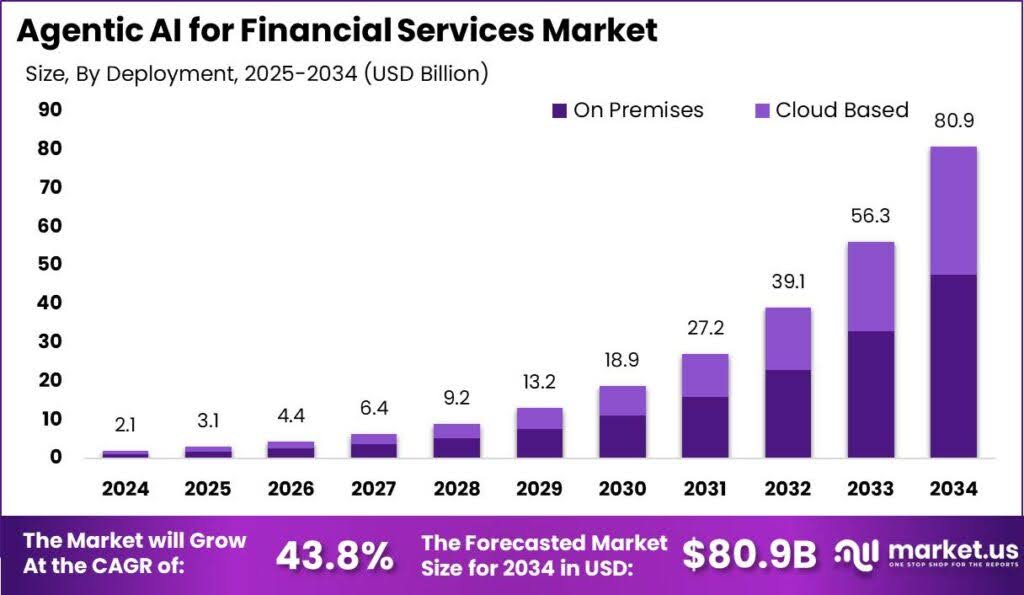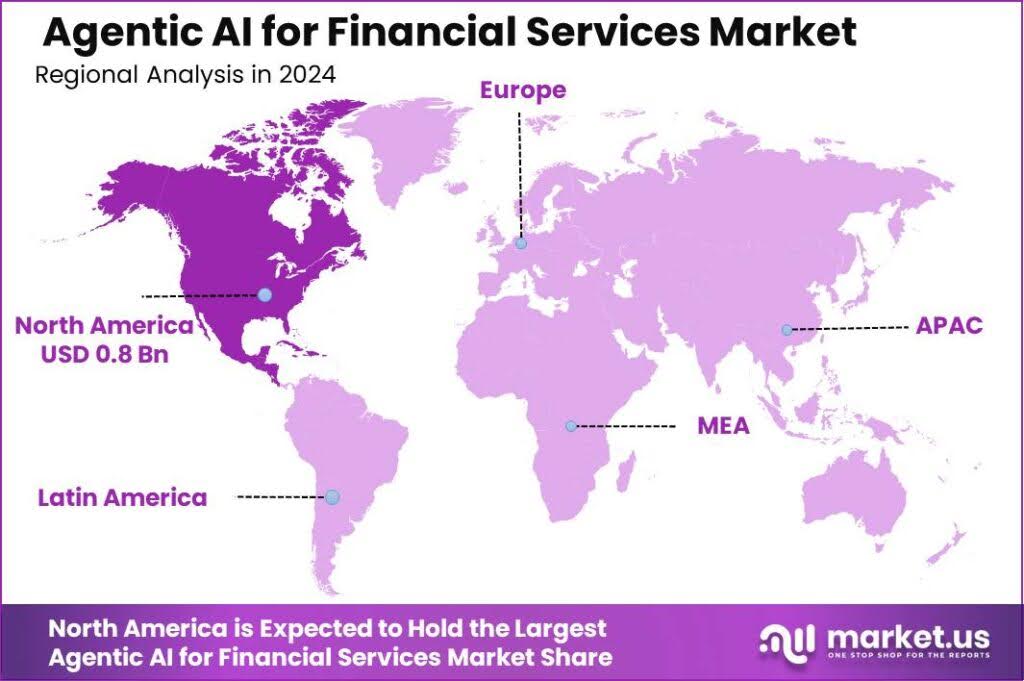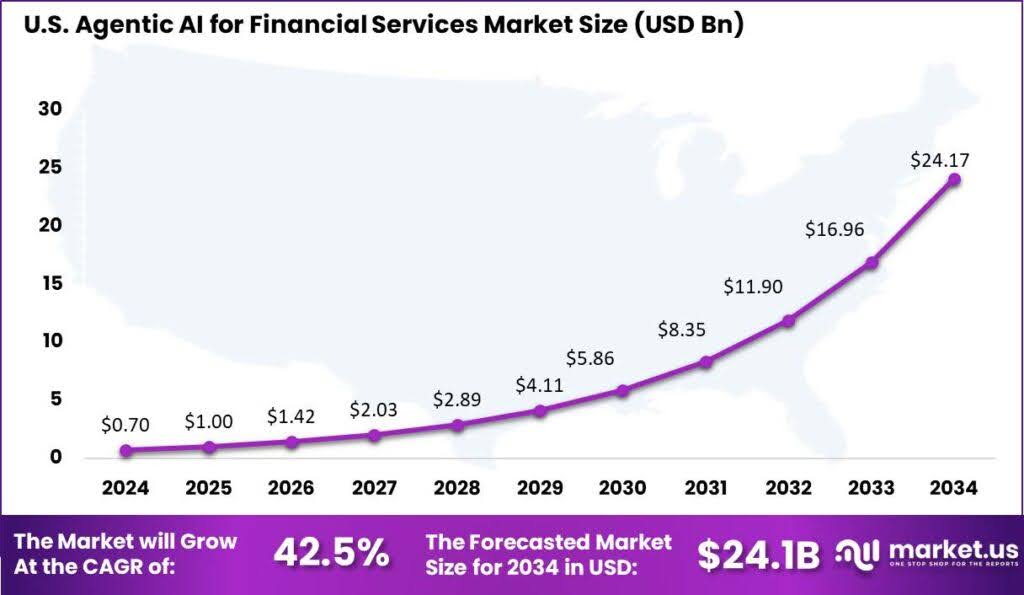The Global Agentic AI for Financial Services market is undergoing a profound transformation, fueled by the sector’s increasing demand for autonomous intelligence, predictive analytics, and adaptive decision-making. In 2024, the market was valued at approximately USD 2.1 billion, and it is projected to reach nearly USD 80.9 billion by 2034, registering an exceptional CAGR of 43.8%.
Financial institutions are rapidly integrating agentic AI to optimize processes such as fraud detection, real-time credit scoring, wealth management automation, and algorithmic trading. These systems are capable of making decisions, learning from outcomes, and independently adjusting strategies – reshaping the operational core of banks, insurers, and asset managers.

The Global Agentic AI market is entering a rapid growth phase, characterized by rising demand for intelligent automation and autonomous decision-making. According to Market.us, the market is forecasted to expand from USD 5.2 billion in 2024 to nearly USD 196.6 billion by 2034, progressing at an impressive CAGR of 43.8%. This surge underscores how businesses worldwide are embracing AI agents not just as tools but as active collaborators capable of interpreting data, taking actions, and adapting strategies in real time. In 2024, North America emerged as the leading region, capturing over 38% of the market and generating approximately USD 1.97 billion in revenue. Within this, the U.S. market alone reached USD 1.58 billion, reflecting a robust CAGR of 43.6% and reinforcing its leadership in AI innovation and adoption.
This momentum is being strongly felt in sectors such as financial services, where investment in Agentic AI is accelerating. Adoption rates within the industry have risen from 19% to 31%, indicating a swift transition toward autonomous tools in areas like fraud detection, algorithmic trading, and credit risk assessment. A recent Capgemini study revealed that while only 10% of organizations currently deploy AI agents, a staggering 82% plan to do so within the next three years. This signals a significant shift in digital strategy, with firms aligning future growth to AI-powered operations. Furthermore, global AI investments are expected to exceed USD 749 billion by 2028, positioning Agentic AI as a critical enabler of efficiency, agility, and innovation across nearly every major industry vertical.
Key Insight Summary
- The market is forecasted to grow sharply from USD 2.1 billion in 2024 to approximately USD 80.9 billion by 2034, achieving a strong CAGR of 43.8%, driven by increasing adoption of autonomous AI systems for decision-making and risk management.
- In 2024, North America led the global market with a 41.4% share, generating about USD 0.8 billion, supported by early adoption in banking and strong investments in AI innovation.
- The U.S. market alone was valued at USD 0.7 billion in 2024, and is projected to grow at a CAGR of 42.5%, reflecting rising enterprise demand for AI-powered solutions to enhance compliance, customer experience, and operational efficiency.
- The Solution segment dominated the landscape with over 67.2% share in 2024, as financial institutions increasingly implemented full-featured agentic AI platforms over standalone services.
- By deployment, the On-Premises segment held a commanding 58.9% share, underscoring the sector’s focus on data security, regulatory adherence, and internal infrastructure control.
- Machine Learning & Deep Learning technologies led the technology landscape, contributing more than 34.8% of the total market in 2024, enabling advanced predictive analytics, pattern recognition, and adaptive decision-making.
Regional Analysis
In 2024, North America maintained a commanding presence, accounting for over 41.4% of the global market and generating around USD 0.8 billion in revenue. The region’s dominance is underpinned by widespread AI readiness, regulatory advancements supporting AI innovation, and the presence of leading financial institutions heavily investing in autonomous digital infrastructure.

The U.S. financial ecosystem, in particular, is leveraging agentic AI to improve customer personalization, reduce compliance risks, and accelerate digital lending cycles. As the industry moves toward more autonomous, transparent, and customer-centric services, agentic AI is expected to become a cornerstone of competitive differentiation and operational resilience across the global financial landscape.

Emerging Trends: Integration of Agentic AI with Personalized Wealth Management
A notable trend shaping the agentic AI landscape in financial services is the increasing integration of agentic AI with personalized wealth management solutions. The technology is being designed to proactively manage portfolios and recommend investment decisions tailored to individual risk profiles and life goals. This reflects a shift from reactive, rule-based automation to more autonomous, context-aware systems capable of reasoning and adapting to evolving client needs. The trend is driven by growing customer expectations for hyper-personalized experiences in banking and investment advisory.
This evolution is further supported by advancements in natural language understanding and multi-modal reasoning, which enable agentic AI systems to engage with clients in more human-like interactions. Financial institutions are increasingly experimenting with AI agents that can simulate professional advisors, assess large volumes of market and client data, and autonomously execute strategies while adhering to compliance requirements. This trend is expected to redefine client engagement models, making advisory services more accessible and responsive.
Key Driver: Rising Demand for Operational Efficiency and Cost Reduction
The adoption of agentic AI in financial services is primarily driven by the sector’s demand for improved operational efficiency and cost optimization. Financial institutions are under continuous pressure to deliver faster, more accurate, and cost-effective services while managing increasingly complex regulatory requirements. Agentic AI addresses these challenges by automating high-volume tasks, such as transaction monitoring, risk analysis, and compliance reporting, thereby reducing human error and operational delays.
Additionally, the driver is reinforced by the growing need to scale operations without proportionally increasing workforce expenses. By deploying autonomous AI agents, firms are able to optimize human resources and redeploy employees to higher-value strategic activities. This supports competitive differentiation in a market where agility and low-cost structures are becoming essential to sustain profitability.
Restraint: Regulatory Ambiguity and Compliance Risks
Despite its potential, agentic AI adoption is restrained by the prevailing ambiguity surrounding regulatory frameworks and the risks of non-compliance. The use of autonomous AI in decision-making introduces questions around accountability, transparency, and explainability of outcomes – aspects that are critical in highly regulated financial environments. Many institutions hesitate to fully deploy such systems in sensitive areas until clearer guidelines are established.
The restraint is compounded by the lack of harmonization among global regulatory bodies, which creates challenges for cross-border financial operations. Concerns over biased decisions, data privacy breaches, and algorithmic opacity also limit the scope of agentic AI deployment, as firms remain cautious about exposing themselves to reputational and legal risks in the absence of mature oversight mechanisms.
Opportunity: Enabling Inclusive Financial Services Access
Agentic AI presents a significant opportunity to enhance financial inclusion by extending access to underserved and unbanked populations. Autonomous AI systems can deliver tailored financial products, provide multilingual support, and operate at scale in regions where traditional banking infrastructure is limited. This capability aligns with broader socio-economic goals of reducing financial inequality and fostering inclusive growth.
The opportunity is particularly relevant in emerging markets, where the demand for affordable, reliable financial services continues to rise. By leveraging agentic AI, institutions can offer micro-loans, savings programs, and financial education to segments historically excluded from formal banking. Such initiatives not only open new revenue streams but also strengthen corporate social responsibility credentials.
Challenge: Balancing Autonomy with Human Oversight
One of the critical challenges facing agentic AI in financial services is achieving the right balance between AI autonomy and human oversight. While autonomy is central to the technology’s value proposition, excessive reliance without adequate human control can lead to errors or unethical outcomes that undermine trust. This challenge is intensified by the complexity of financial decisions, which often require nuanced judgment and moral reasoning beyond algorithmic capability.
Addressing this challenge requires institutions to invest in robust monitoring frameworks, establish clear governance policies, and design hybrid models where humans and AI collaborate effectively. Building customer confidence in autonomous agents while ensuring accountability remains a delicate task, particularly as the technology continues to evolve and its decisions grow more opaque to non-technical stakeholders.
Key Market Segments
By Offering
- Solution
- Data Integration
- Predictive Analytics
- Autonomous Decision-Making
- Automation of Routine Tasks
- Others
- Services
- Professional Services
- Managed Services
By Deployment
- Cloud Based
- On Premises
By Technology
- Machine Learning & Deep Learning
- Computer Vision
- Natural Language Processing (NLP)
- Blockchain-Enabled AI
- Others
By Application
- Personalized Financial Advisory
- Fraud Detection and Prevention
- Automated Trading Systems
- Customer Service Automation
- Risk Management
- Loan and Credit Underwriting
- Portfolio Management
- Others (Regulatory Compliance, Insurance Claims Processing, etc.)
Top Key Players in the Market
- Akira AI
- Everest Global, Inc.
- UiPath
- Aisera
- Cognizant
- International Business Machines Corporation (IBM)
- Anaptyss
- Zetaris
- moData
- Endava
- Others
Discover More @ https://market.us/report/agentic-ai-for-financial-services-market/
The macro analyst desk brings highly sought after financial news based on market analysis, insider news and company filings.
